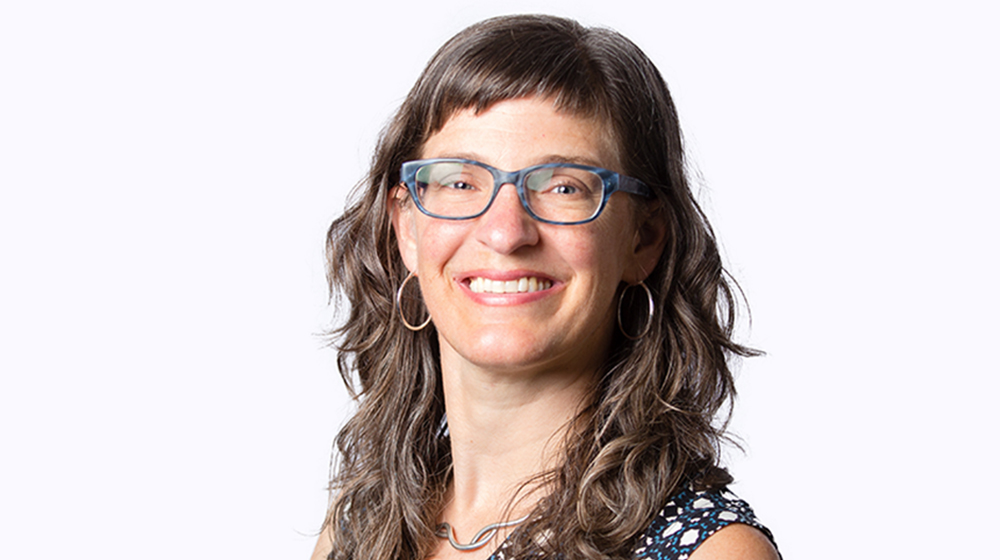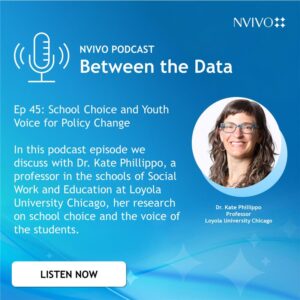
School choice is a loaded topic in public policy and discourse these days. A mix of diverse parties and high stakes makes it an exciting area for research. But the complexity of the societal, political, and cultural factors involved also makes it a very challenging one.
Dr. Kate Phillippo, a professor in the School of Social Work and Education at Loyola University Chicago, noticed that one important voice tended to be missing in the conversation: that of the students. “A lot of the research on school choice was about parents, which is interesting,” she notes.
At the same time, discourse about school choice has become increasingly volatile in recent years. Professor Phillippo points out instances where school board members have been removed, parents have gone to court about changes in admissions processes, and, in an alarming trend, people involved have faced serious threats and harassment. “These things show how politically relevant selective public schools are, what an intensely public issue they are, touching on matters of things like college access, race, and opportunity,” she says.
>> Listen to the Full NVivo Podcast Here
Listening to Students’ Voices as Policy Actors
For her book A Contest Without Winners: How Students Experience Competitive School Choice, which was published in 2019, Professor Phillippo viewed students as policy actors. But she notes that students are also early adolescents, which requires looking at developmental theory to understand them as “socially and cognitively situated” in their families, their neighborhoods, and the greater world. “Young people are making these decisions not based on what a page in a guidebook says, but on how they feel about a neighborhood, maybe a neighborhood they’ve never been to,” she says.
Choosing Appropriate Frameworks for Policy Research
In her current study, Professor Phillippo is expanding her research to look at the variety of policy actors involved in changes to selective schools’ policy. These include students, who may have roles as student representatives on the board and as activists, as well as community activists, organizational leaders, school district employees, and teachers.
To explore how they all come together, she pulls from different theories about public discourse and debate as well as the concept of strategic action fields. “A city is one example of a strategic action field,” she explains. “Different actors involved in a policy process in that field are generally going to have a shared understanding of what the rules of engagement are, what the span is of what they're dealing with, how power is distributed, and how things come along to disrupt those very stable arrangements,” such as the pandemic. This theory helps her identify the social mechanisms and interactions that are involved in pushes for change, as well as those that push back to try to maintain stability.
Collecting and Analyzing Data from Diverse Sources
Professor Phillippo’s priority is to hear directly from people who are involved in her topics. “I want to interview people, I want to observe the spaces where policies are being carried out, are being debated, are being made sense of,” she says.
She also draws from what she calls “potential documents in a really rich world”—everything from Twitter to online petitions to recordings or transcripts of school board meetings. “There’s just so much to look at that can become material with which to conduct research,” she notes.
Professor Phillippo has also noticed that the ability to access such meetings remotely has also affected how people behave and communicate. “That really changes who can be involved and also changes the level of public scrutiny, which changes how policy actors actually conduct themselves, because they know this is going to live forever,” she points out.
Using NVivo to Support Research
As for analysis, Professor Phillippo remembers when instructors and advisors did qualitative coding on paper with scissors, note cards, and highlighter, so she appreciates new research technologies. “I love using qualitative coding software to name codes, to come up with a great definition that everybody can access, that we can change, that we can give examples of,” she says. It also allows for flexibility. “That's a really nice thing about NVivo or other programs, is being able to have code clusters. In my current study, I have a code cluster about efforts to influence policy, a code cluster for issues of race and racism, which includes any use of race language, any reference to the Black Lives Matter movement, any examples of racism.”
Findings: The Implications of School Choice as a Lens on Society
Selective school choice, while perhaps directly affecting only a small percentage of the population, is “really a lightning rod,” says Professor Phillippo. Key observations from her research so far include:
- The competition for good schools illustrates how critical education is to thrive in our society, impacting everything from lifetime earnings to long-term health outcomes.
- The school choice process should be more accessible to students who may not have sufficient parental support to help them navigate it.
- There should be more consideration of how the competition affects parenting and teaching, as well as the children themselves. “Why do we put young people in the position of creating opportunities for themselves when they're 11?” she asks.
Research, Power, and Privilege
When researching public policy, Professor Phillippo stresses that preparation is crucial before interviews. “Do your homework before you ask people to spend their time. And then really pay attention,” she says. “It can be a very, very vulnerable experience, especially asking people about issues around power and privilege. It's really a gift for them to take those risks to talk with you.”
Just as she identifies issues of access and power in her topics, she questions the traditional hierarchical approach to academic research. “Power is real, and I don't want to pretend that that doesn't exist,” she says. “But by the same token, everybody on a research team matters.”
She thinks it’s particularly valuable to encourage perspectives from people with different experiences and backgrounds. “Other people will see things that I won’t see by virtue of who they are, what age they are, and what their identities are,” she says—all of which can result in a more rewarding research experience and outcomes.
For more details about Professor Phillippo’s research on selective school policies and her findings, listen to the podcast episode.

